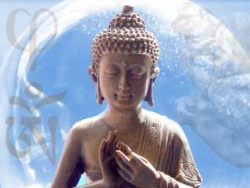Difference between revisions of "Eight bhumis"
Jump to navigation
Jump to search
| Line 1: | Line 1: | ||
[[File:Int_phil.jpg|thumb|250px|]] | [[File:Int_phil.jpg|thumb|250px|]] | ||
| − | |||
| − | |||
| − | |||
| − | |||
| − | |||
| − | |||
| − | |||
| − | |||
| − | |||
| − | |||
| − | |||
| − | |||
| − | |||
| − | |||
| − | |||
| − | |||
| − | |||
| − | |||
| − | There is also a tradition of counting only seven stages.<ref>{{Nolinking|See Tsepak Rigdzin, ''Dictionary of Buddhist Terms'', p. 92}}</ref> | + | |
| + | |||
| + | |||
| + | |||
| + | The '''eight [[bhumi]]s''' or '''[[eight bhumis]] of the [[shravakas]]''' ([[Wyl.]] ''[[nyan thos kyi sa brgyad]]'') are eight levels of [[realization]] reached on the [[path]] of the [[basic vehicle]]. There are different [[traditions]] of counting the eight. According to one version<ref>{{Nolinking|See for example [[Jikmé Lingpa]] & [[Kangyur Rinpoche]], ''Treasury of Precious Qualities'', Padmakara, p.141 and n.97 p.365}}</ref> the sequence is as follows: | ||
| + | |||
| + | |||
| + | #The [[gotra bhumi]] (''[[gotrabhūmi]]''; ''[[rigs kyi sa]]'') | ||
| + | #The [[eighth bhumi]] (''[[aṣṭamakabhūmi]]''; ''[[sa brgyad pa]]'') | ||
| + | #The [[seeing bhumi]] (''[[darśanabhūmi]]''; ''[[mthong ba'i sa]]'') | ||
| + | #The [[fine bhumi]] (''[[tanubhūmi]]''; ''[[srab pa'i sa]]'') | ||
| + | #The [[bhumi]] of freedom from [[desire]] (''[[vitarāgabhūmi]]''; '' [['dod chags dang bral ba'i sa]]'') | ||
| + | #The [[bhumi of realized tasks]] (''[[byas pa rtogs pa'i sa]]'') | ||
| + | #The [[shravaka]] [[bhumi]] (''[[nyan thos kyi sa]]'') | ||
| + | #The [[pratyekabuddha]] [[bhumi]] (''[[rang sangs rgyas kyi sa]]'') | ||
| + | |||
| + | |||
| + | An alternative [[tradition]]<ref>{{Nolinking|See for example [[Dungkar Lobzang Trinlé]], ''Great Dictionary'', p.922}}</ref> lists them as follows: | ||
| + | |||
| + | |||
| + | #The [[bhumi of seeing the pure]] (''[[śuklavidarśanabhūmi]]''; ''[[dkar po rnam par mthong ba'i sa]]'') | ||
| + | #The [[gotra bhumi]] (''[[gotrabhūmi]]''; ''[[rigs kyi sa]]'') | ||
| + | #The [[eighth bhumi]] (''[[aṣṭamakabhūmi]]''; ''[[sa brgyad pa]]'') | ||
| + | #The [[fine bhumi]] (''[[tanubhūmi]]''; ''[[srab pa'i sa]]<ref>or [[bsrab pa'i sa]]</ref>'') | ||
| + | #The [[bhumi]] of freedom from [[desire]] (''[[vitarāgabhūmi]]''; '' [['dod chags dang bral ba'i sa]]'') | ||
| + | #The [[bhumi of realized tasks]] (''[[byas pa rtogs pa'i sa]]'') | ||
| + | #The [[shravaka]] [[bhumi]] (''[[nyan thos kyi sa]]'') | ||
| + | #The [[pratyekabuddha]] [[bhumi]] (''[[rang sangs rgyas kyi sa]]'') | ||
| + | |||
| + | |||
| + | There is also a [[tradition]] of counting only seven stages.<ref>{{Nolinking|See Tsepak Rigdzin, ''Dictionary of Buddhist Terms'', p. 92}}</ref> | ||
{{reflist}} | {{reflist}} | ||
Latest revision as of 14:23, 11 December 2023
The eight bhumis or eight bhumis of the shravakas (Wyl. nyan thos kyi sa brgyad) are eight levels of realization reached on the path of the basic vehicle. There are different traditions of counting the eight. According to one version[1] the sequence is as follows:
- The gotra bhumi (gotrabhūmi; rigs kyi sa)
- The eighth bhumi (aṣṭamakabhūmi; sa brgyad pa)
- The seeing bhumi (darśanabhūmi; mthong ba'i sa)
- The fine bhumi (tanubhūmi; srab pa'i sa)
- The bhumi of freedom from desire (vitarāgabhūmi; 'dod chags dang bral ba'i sa)
- The bhumi of realized tasks (byas pa rtogs pa'i sa)
- The shravaka bhumi (nyan thos kyi sa)
- The pratyekabuddha bhumi (rang sangs rgyas kyi sa)
An alternative tradition[2] lists them as follows:
- The bhumi of seeing the pure (śuklavidarśanabhūmi; dkar po rnam par mthong ba'i sa)
- The gotra bhumi (gotrabhūmi; rigs kyi sa)
- The eighth bhumi (aṣṭamakabhūmi; sa brgyad pa)
- The fine bhumi (tanubhūmi; srab pa'i sa[3])
- The bhumi of freedom from desire (vitarāgabhūmi; 'dod chags dang bral ba'i sa)
- The bhumi of realized tasks (byas pa rtogs pa'i sa)
- The shravaka bhumi (nyan thos kyi sa)
- The pratyekabuddha bhumi (rang sangs rgyas kyi sa)
There is also a tradition of counting only seven stages.[4]
Footnotes
- ↑ See for example Jikmé Lingpa & Kangyur Rinpoche, Treasury of Precious Qualities, Padmakara, p.141 and n.97 p.365
- ↑ See for example Dungkar Lobzang Trinlé, Great Dictionary, p.922
- ↑ or bsrab pa'i sa
- ↑ See Tsepak Rigdzin, Dictionary of Buddhist Terms, p. 92
